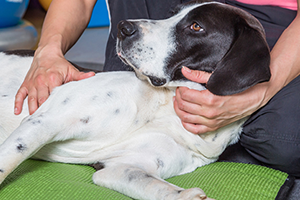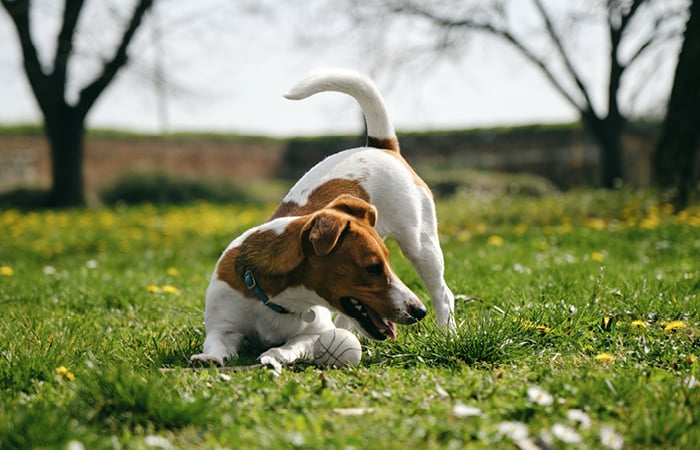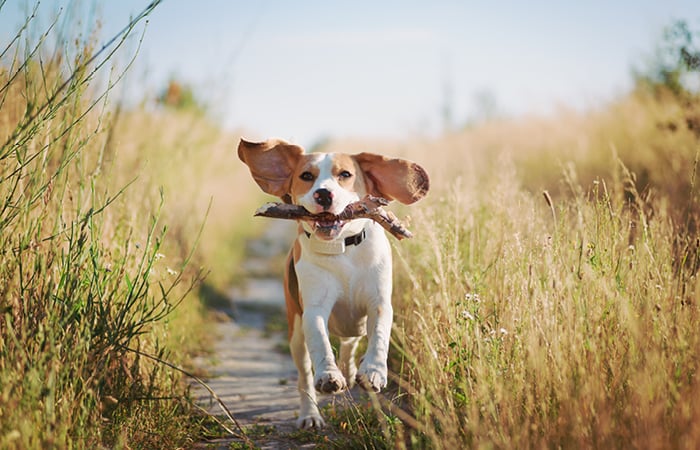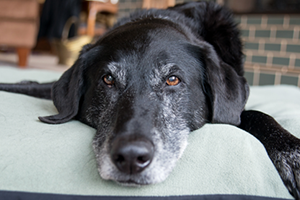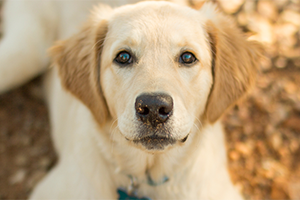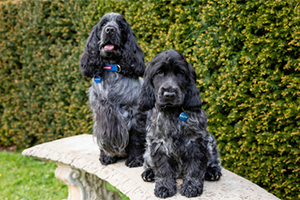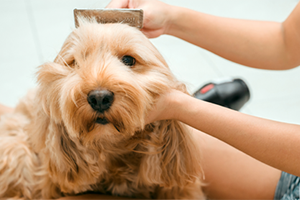
These easy going and energetic dogs are a top choice for first-time owners
Vital stats
Swipe to view more
| Size: | Medium to large |
| Coat: | Three types: hair coat, wool coat and fleece coat. Hypoallergenic |
| Exercise | 1 hour a day |
| Life span: | 12-15 years |
| Breed group: | Crossbreed (Gundog and Utility) |
| Temperament: | Intelligent, friendly, curious |
Labradoodle temperament & personality

- Easy going and keen to be friends with everyone.
- Suitable for households with other pets and young children, so long as their tendency for boisterous play is kept in check.
- These dogs aren’t afraid to be vocal when they need your attention and may bark when they are stressed, anxious, or bored.
- Ideal for confident first time owners or families with some dog experience.
- Naturally curious, they can be destructive if they become bored so benefit from plenty of mental stimulation.
- Labradoodles can tolerate being alone for short periods but can suffer from separation anxiety.
Labradoodle training & exercise

Training tips
- Labradoodles respond well to consistency and positive reinforcement; they’re extremely motivated by food!
- Petplan’s veterinary expert, Brian Faulkner, recommends Labradoodle socialisation begins from a young age to prevent dominant behaviours developing.
Game ideas
- Labradoodles excel in lots of canine sports and will enjoy agility courses that include tunnel running, jumping hurdles and pole weaving.
- With their Poodle and Labrador ancestors both bred as gundogs, it’s only natural that Labradoodle have strong retrieval instincts. Try “magic tricks”, like hiding a treat under one of three cups, mixing them up and letting your dog guess where the treat is hiding.
- As they are highly motivated by food, Labradoodles will enjoy puzzle feeders stuffed with their favourite treat to keep them entertained.
Keeping them happy
- Spend some extra time on recall! Due to their Labrador heritage, most Labradoodles can be taught excellent recall so they can enjoy time off the lead to explore.
- Since Labradors and Poodles are both very intelligent, mental stimulation is just as important as physical exercise, and behaviour problems can develop if they become bored.
Exercise
- Adult Labradoodles need at least an hour of physical exercise each day.
- Labradoodles need plenty of outside space to stretch their legs, ideally a well-fenced, secure garden.
- Labradoodle’s are usually great swimmers and love water. Swimming is also low impact, making it a great choice for senior Labradoodles or those with joint problems.
Common Labradoodle health conditions
All dogs can develop allergies, and Labradoodles are no exception. Common Labradoodle allergies can be divided into three main types:
- Contact allergies: These occur as a result of your dog coming into contact with an allergen such as a specific substance or fabric.
- Food allergies: Caused by something in your Labradoodle’s diet or something they’ve eaten without you knowing.
- Environmental allergies: These refer to airborne allergens in your environment, such as pollens from grasses, weeds and trees.
Allergies result in dermatitis which can often lead to secondary skin infections. Labradoodles can suffer from other skin conditions as a result of parasites and hormonal changes inside the body. Treatment varies according to the severity, but skin disorders can be managed using various treatments, usually required long-term, which means your dog can get on with enjoying life.

Labradoodle grooming

Labradoodle coat type can vary depending on the dominance of their parents’ genes. All coat types are considered non to low shedding, but regular maintenance is essential.
- Labradoodles come in three coat varieties: hair coat, which is similar to the fur seen in shedding breeds; wool coat, which is denser, hangs in long curls and is non-shedding; and fleece coat, which is soft, silky and curly.
- Bred to be hypoallergenic, Labradoodles may be a good pet for someone with allergies as they shed less than other dogs.
- Your Labradoodle’s grooming requirements will vary depending on the length and type of their coat. Aim to brush twice a week with a trip to the groomer’s two to four times per year.
- Bathe your Labradoodle only when they are visibly dirty or smelly. Bathing too frequently could dry out their skin and cause them to become itchy.
- Check for lumps, bumps and parasites whilst grooming.
- Brush your Labradoodle’s teeth as often as possible to prevent gum disease and associated issues.
Labradoodle nutrition

Labradoodles love food and eating and will happily try to eat anything that they find, even if it’s not edible!
- Labradoodle puppies should be fed a restricted diet to slow their growth. Growing too quickly puts them at greater risk of developing joint problems. Your vet will be able to advise on the best diet for your dog.
- Your Labradoodle may not be fussy, but it is still important to feed them a high quality diet of a feed that meets all of their nutritional requirements.
- Keep a close eye on your Labradoodle’s weight by using portion control and limiting snacks.
- Adult Labradoodles should be fed twice a day to spread their daily calorie intake across meals.
What to know before you buy or rehome a Labradoodle

Considering offering a Labradoodle puppy a home? Before you buy or adopt a Labradoodle, here are a few crucial things to take into consideration.
- Labradoodles are easy going, adaptable dogs that will suit most lifestyles but they are big, energetic dogs who need mental and physical stimulation to stop them getting bored.
- Labradoodles can master new tricks quickly, making them fun to train; just ask Petplan Veterinary Expert Brian Faulker, who has two! But they are naturally confident, so let them know who’s in charge early on.
- Be fussy about the Labradoodle breeder you choose if you’re buying a puppy. ‘Lucy’s Law’ dictates that new puppies or kittens must be bought directly from a breeder or adopted from rescue. Third party sellers are illegal.
- Choose a licensed and reputable breeder who will be able to provide proof of genetic testing, like hip and elbow scores, for both parents to help you choose a healthy dog. Any good breeder will want to ensure that their puppies are going to good homes – so expect to be ‘interviewed’ so they can assess your suitability as Labradoodle parents.
- “As crossbreeds, Labradoodle characteristics aren’t as ingrained as their parents,” explains Petplan’s veterinary expert Brian Faulkner, “So it’s important to see both mum and dad to obtain an accurate idea of personality, size and colour.”
Labradoodle frequently asked questions
Discover some of the most popular dog breeds
Labradoodle insurance considerations
We always offer these things as standard:
Physiotherapy & pet therapies
Along with physiotherapy, which is covered within the Vet Bills benefit, we also cover Pet Therapies like herbal medicine, homeopathy and acupuncture. You can also claim for hydrotherapy, up to £500 per illness/injury in dogs and cats (no additional limit for rabbits).
Petplan is a trading name of Pet Plan Limited (Registered in England No. 1282939) and Allianz Insurance plc (Registered in England No. 84638), Registered office: 57 Ladymead, Guildford, Surrey GU1 1DB.
Pet Plan Limited is authorised and regulated by the Financial Conduct Authority. Financial Services Register No. 311969. Allianz Insurance plc is authorised by the Prudential Regulation Authority and regulated by the Financial Conduct Authority and the Prudential Regulation Authority. Financial Services Register No. 121849. Pet Plan Limited is a subsidiary of Allianz Insurance plc.





































